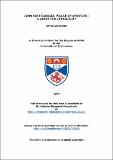Files in this item
John Bate Cardale, pillar of apostles : a quest for Catholicity
Item metadata
| dc.contributor.advisor | Gilley, Sheridan | |
| dc.contributor.author | Lancaster, John | |
| dc.coverage.spatial | 236 p. | en_US |
| dc.date.accessioned | 2017-11-10T09:09:44Z | |
| dc.date.available | 2017-11-10T09:09:44Z | |
| dc.date.issued | 1977 | |
| dc.identifier | uk.bl.ethos.723417 | |
| dc.identifier.uri | https://hdl.handle.net/10023/12046 | |
| dc.description.abstract | John Bate Cardale (1802-l877) is the forgotten man of the Catholic Apostolic Church. Edward Irving and Henry Drummond who were both influential in the pre-history and early days of the church received historical and biographical treatment long ago. Cardale, whose influence was more decisive and longer lived than that of his two colleagues has until now been ignored. His life and works show his personal participation in the quest for catholicity which was taking place in all churches during the nineteenth century, a participation which was reflected in the theology, worship and organization of the Catholic Apostolic Church. The essentially hidden quality of Cardale's life together with the Catholic Apostolic rule of secrecy in regard to historic documents mean that insights into his life must be gained from the little material in the hands of descendants and from secondary sources. The Catholic Apostolic Liturgy together with its two volume theological commentary, Readings upon the Liturgy, are Cardale's chief literary monuments. His lesser works generally serve to illuminate minor themes not treated in the Readings while his homiletic material is principally devotional in character. Theologically Cardale is an inheritor of the patristic and western catholic tradition. He follows his mentor Irving in his understanding of the Incarnation but breaks new ground in his doctrine of the Church and its ministry by his unique exegesis of Ephesians 4:11-13. Cardale's approach to the dominical sacraments is motivated by concern for theological truth and pastoral nurture. The services Cardale compiled and revised in the Liturgy seek to be based on theological principle, to meet pastoral, psychological and devotional need and to draw from the liturgical riches of ancient, Orthodox and western catholic traditions. Cardale's gift of leadership, his theological precision and his liturgical creativity, the personal expressions of authority, tradition and comprehensiveness, reacted to produce the most significant figure in the life of the Catholic Apostolic Church and an important one on the sidelines of nineteenth-century ecclesiastical history in England. | en_US |
| dc.language.iso | en | en_US |
| dc.publisher | University of St Andrews | |
| dc.subject.lcc | BX1979.C2L2 | |
| dc.subject.lcsh | Cardale, John Bate, 1802-1877 | |
| dc.subject.lcsh | Catholic Apostolic Church (1832-)--History | en |
| dc.title | John Bate Cardale, pillar of apostles : a quest for Catholicity | en_US |
| dc.type | Thesis | en_US |
| dc.contributor.sponsor | Vancouver School of Theology. H. R. Macmillan Committee | en_US |
| dc.contributor.sponsor | Anglican Church of Canada. General Synod. Bursary Unit | en_US |
| dc.contributor.sponsor | Anglican Church of Canada. Diocese of British Columbia | en_US |
| dc.type.qualificationlevel | Masters | en_US |
| dc.type.qualificationname | BPhil Bachelor of Philosophy | en_US |
| dc.publisher.institution | The University of St Andrews | en_US |
This item appears in the following Collection(s)
Items in the St Andrews Research Repository are protected by copyright, with all rights reserved, unless otherwise indicated.

